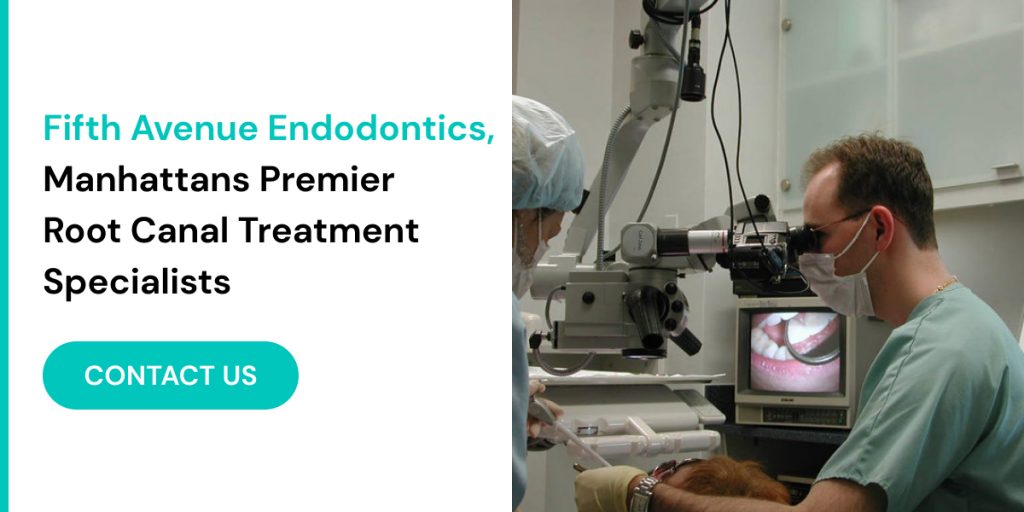Sinus issues are a common complaint among many individuals, often manifesting as nasal congestion, facial pressure, or headaches. While these symptoms are frequently attributed to sinusitis or allergies, there’s an important factor that many people overlook: dental health. At Fifth Avenue Endodontics in Manhattan, we frequently encounter patients who are astonished to discover that their sinus discomfort might actually be linked to dental problems.
This surprising connection stems from the close proximity of the maxillary sinuses to the upper jaw’s roots. When an infection or inflammation affects the teeth in this area, it can extend to the sinus cavities, causing symptoms that mimic those of sinusitis. As a result, patients might experience persistent sinus problems despite receiving treatment for other causes.
In this blog post, we will delve into how endodontic therapy—more commonly known as a root canal—can address sinus issues that originate from dental infections. By exploring this often-overlooked connection, we aim to shed light on how endodontic care can provide relief and improve overall well-being. Stay tuned as we unravel the crucial role that endodontic therapy plays in alleviating sinus discomfort linked to dental health issues.
Understanding the Connection Between Sinus Issues and Endodontic Health
The relationship between sinus issues and dental health might not be immediately apparent, but it is a well-recognized link that Manhattan endodontics frequently address. The maxillary sinuses, which are located just above the upper jaw, are particularly susceptible to being influenced by dental problems. Because of their close proximity to the upper molars, issues in these teeth can have a direct impact on the sinuses.
When an upper molar becomes infected or suffers from severe decay, the resulting infection can easily spread to the sinus cavities. This is because the roots of the upper molars extend close to the sinus floor, creating a pathway for infection to travel. Such infections often lead to inflammation in the sinus area, causing symptoms such as pressure, pain, and nasal congestion—symptoms that can be mistaken for sinusitis.
Dr. Iofin, a leading specialist at Fifth Avenue Endodontics in Manhattan, frequently encounters cases where patients present with sinus infection symptoms that are actually the result of underlying dental issues. For instance, an untreated cavity or an abscessed tooth in the upper jaw can lead to an infection that extends into the sinus cavity. This can cause significant discomfort, and patients often find themselves seeking treatment for sinusitis without realizing that the root cause is dental in nature.
The symptoms of dental-related sinus issues can closely resemble those of sinusitis, making it crucial for patients to seek a thorough evaluation. By identifying the dental origins of these symptoms, endodontists like Dr. Iofin can provide targeted treatment to address the root cause, leading to both dental and sinus relief. Understanding this connection highlights the importance of comprehensive dental care and the role endodontic therapy plays in treating sinus-related issues.
How Endodontic Therapy Can Help
Endodontic therapy, commonly known as a root canal, is a crucial procedure for addressing issues within a tooth’s pulp and root system. This therapy can be particularly effective in resolving sinus problems linked to dental infections. Here’s a detailed look at how endodontic therapy can aid in alleviating sinus-related discomfort:
1. Eliminating Infection
The primary purpose of endodontic therapy is to remove infected or damaged tissue from within the tooth. The procedure involves cleaning out the tooth’s pulp chamber and root canals to eliminate bacteria and debris. By addressing the source of the infection, endodontic therapy prevents the infection from spreading to adjacent areas, including the sinuses. When the infection in the tooth is resolved, the associated sinus inflammation often diminishes, leading to significant relief from symptoms such as pressure, congestion, and facial pain. This is particularly important when the infection has spread from the tooth to the sinus cavity, causing sinus-like symptoms that might otherwise be misdiagnosed or left untreated.
2. Preventing Recurrence

Beyond treating existing infections, endodontic therapy plays a crucial role in preventing future issues. After the infected pulp is removed, the dentist cleans and disinfects the root canals thoroughly before sealing them with a biocompatible material. This sealing process not only addresses the current infection but also acts as a barrier against future bacterial invasion. By thoroughly sealing the tooth, endodontic therapy reduces the risk of reinfection and ensures that bacteria cannot re-enter the tooth and potentially spread to the sinuses again. This preventive approach helps maintain long-term dental and sinus health, minimizing the likelihood of recurring issues that could lead to further discomfort or complications.
3. Relieving Pain
Sinus issues related to dental infections often come with significant pain and discomfort. This pain can be both dental, originating from the infected tooth, and sinus-related, due to inflammation and pressure in the sinus cavities. Endodontic therapy addresses the root cause of this pain by removing the infected pulp and treating the underlying dental problem. Once the infected tissue is removed and the tooth is restored, patients frequently experience a reduction in both dental pain and sinus pressure. This dual relief is invaluable, as it not only treats the immediate symptoms but also improves overall comfort and quality of life.
In summary, endodontic therapy offers a comprehensive solution to dental infections that can lead to sinus problems. By eliminating infection, preventing recurrence, and relieving pain, this procedure provides effective treatment for individuals experiencing sinus issues linked to their dental health. For those suffering from such conditions, consulting with a specialist like Dr. Iofin at Fifth Avenue Endodontics in Manhattan can provide the targeted care needed to address both dental and sinus-related concerns.
When to Seek Endodontic Therapy
If you’re dealing with sinus symptoms such as nasal congestion, facial pain, or pressure, and have a history of dental issues, it’s essential to consider the possibility that these symptoms might be connected to your dental health. In such cases, consulting with Manhattan endodontics could be a prudent step. Dr. Iofin and the team at Fifth Avenue Endodontics specialize in diagnosing and treating conditions where dental problems impact sinus health.
Here are some specific indicators that it might be time to seek endodontic therapy:
1. Persistent Sinus Symptoms with a Dental History
If you’re experiencing persistent sinus symptoms, particularly if you have a history of dental problems such as tooth decay, gum disease, or previous root infections, it’s crucial to explore whether these symptoms might be related to your teeth. Symptoms like chronic nasal congestion, recurring sinus headaches, or facial pressure, especially when accompanied by dental discomfort, could be indicative of an underlying dental issue that’s affecting your sinuses. An endodontist can assess whether the source of these symptoms is an infection in your upper molars or other dental problems.
2. Unexplained Facial Pain or Sensitivity
Facial pain or sensitivity that does not seem to have a clear cause or that worsens with changes in position or pressure can sometimes be linked to dental infections. If you notice that your facial pain correlates with dental issues, such as recent dental work or persistent tooth pain, consulting with an endodontist is advisable. Endodontic therapy can address these underlying infections and potentially relieve the associated sinus discomfort.
3. Failure to Respond to Typical Sinus Treatments
If you’ve been treating sinus issues with standard remedies—such as decongestants, nasal sprays, or antibiotics—and have not seen improvement, it may be worth considering that the issue could be dental in nature. A comprehensive evaluation by an endodontist can help determine if a dental infection is the true cause of your sinus symptoms. In such cases, traditional sinus treatments alone may not resolve the issue, and addressing the dental problem may be necessary for full relief.
Comprehensive Evaluation
It’s important to understand that while endodontic therapy can address sinus issues related to dental infections, a thorough examination is essential to confirm the diagnosis. Sinus problems can arise from various causes, including allergies, infections, or structural issues. A detailed evaluation by Dr. Iofin and his team at Fifth Avenue Endodontics will ensure that all potential causes are considered, and the most appropriate treatment plan is developed. This comprehensive approach helps to address both the symptoms and their underlying causes effectively, ensuring that you receive the best care for your health and comfort.
If you’re experiencing sinus symptoms alongside dental issues, seeking an evaluation from an endodontist may provide valuable insights and relief. Dr. Iofin and the team at Fifth Avenue Endodontics are dedicated to offering expert care and tailored treatments to address both dental and sinus health concerns.

Conclusion
Addressing sinus issues with endodontic therapy is an important aspect of dental care that can often be overlooked. By understanding the connection between sinus problems and dental health, patients can seek timely treatment and find relief from their symptoms. At Fifth Avenue Endodontics, Dr. Iofin and his team are dedicated to providing expert care for those experiencing sinus issues related to dental problems. If you suspect that your sinus discomfort might be linked to a dental infection, don’t hesitate to schedule an appointment. With the right treatment, you can achieve both dental and sinus health.
For further information or to schedule a consultation, contact Fifth Avenue Endodontics in Manhattan. Our team is here to help you navigate your path to better health and comfort.
By addressing these concerns through endodontic therapy, we aim to offer not only relief but also a better quality of life for our patients. Remember, sinus issues and dental health are closely connected, and seeking the right care can make all the difference.

